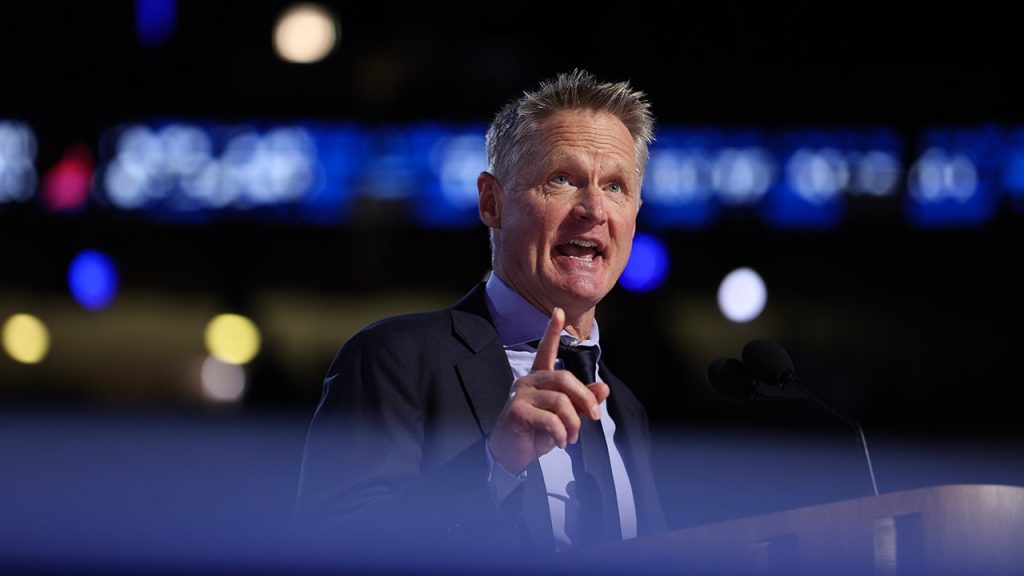The Trump campaign criticized Golden State Warriors head coach Steve Kerr for his previous refusal to comment on the NBA’s controversial relationship with China, despite his recent speech at the Democratic National Convention emphasizing the importance of speaking up in the upcoming presidential election. Kerr, fresh off coaching Team USA at the 2024 Paris Olympics, voiced his support for Vice President Kamala Harris and running mate Tim Walz during the DNC speech, stating that he believed leaders must display dignity and tell the truth. Kerr concluded his speech by referencing former President Trump, saying, “we can tell Donald Trump, ‘Night, night!’”
In response to Kerr’s speech, the Trump campaign called out the coach for his previous silence on China’s human rights abuses, despite his newfound willingness to speak up in the current election. The campaign pointed out Kerr’s lack of comment on the issue when asked in 2019, after Chinese state television decided not to air NBA exhibition games due to the league’s response to comments in support of pro-democracy protesters in Hong Kong. Kerr had stated at the time that the issue was a “really bizarre international story” and that he preferred to speak on topics he was passionate and well-versed in.
Furthermore, Kerr faced criticism for his comments regarding human rights abuses in the U.S. versus China during a press conference in 2019. When asked if he had been questioned about Chinese human rights while in the country, Kerr responded that it had not come up, nor had American human rights abuses. He suggested that the world was a complex place with more gray areas than black and white, indicating his reluctance to delve into such controversial and sensitive topics. These responses drew further scrutiny and backlash from those who felt Kerr was avoiding important issues for the sake of comfort and convenience.
The ongoing debate over Kerr’s past reluctance to comment on China’s human rights abuses highlights the complexities and challenges of discussing political and social issues as a public figure. Kerr’s decision to speak out at the DNC, despite his previous silence on the NBA-China controversy, raises questions about the motivations and responsibilities of individuals in positions of influence when it comes to addressing important issues. The Trump campaign’s social media post and video highlighting Kerr’s contrasting responses to different political matters serve as a reminder of the expectations placed on public figures to engage with and take a stand on pressing social and ethical concerns.
As an accomplished coach, former player, husband, son, father, and grandfather, Kerr’s decision to use his platform to advocate for particular political beliefs at the DNC demonstrates his commitment to certain values and principles he deems important. While his previous reticence to comment on the NBA-China issue may have been criticized, Kerr’s willingness to now speak up on broader political matters indicates a shift in his approach to engaging with contentious topics. The response to Kerr’s actions serves as a reflection of the larger societal and political landscape, where individuals are increasingly pressured to take a stand and voice their opinions, even in the face of potential risks or backlash.
Ultimately, Kerr’s speech at the DNC and the subsequent reaction from the Trump campaign underscore the challenges and complexities of navigating political engagement and social issues in the public sphere. Kerr’s contrasting responses to different political matters highlight the nuances and dilemmas faced by public figures when addressing contentious topics, particularly in a polarized political climate. The scrutiny and criticism directed at Kerr for his past silence on China’s human rights abuses serve as a reminder of the expectations placed on individuals with influence to use their platforms responsibly and authentically engage with important issues in society.


